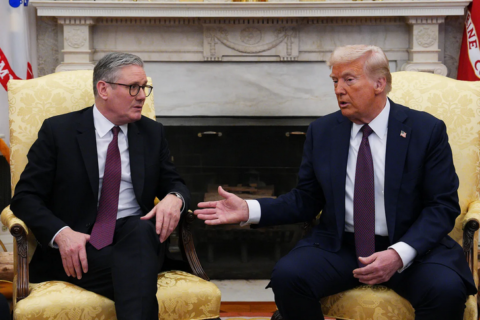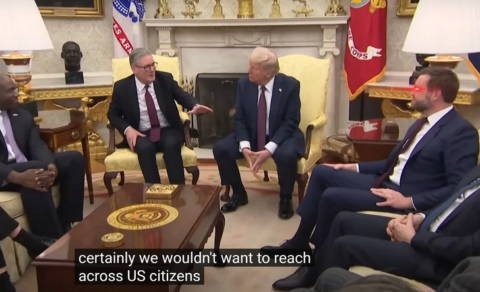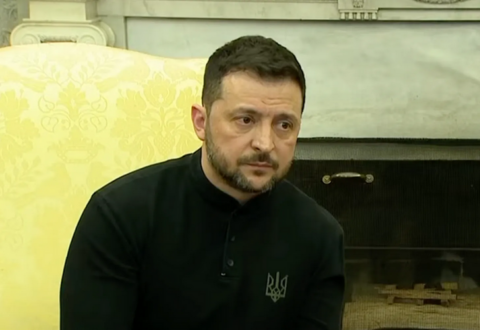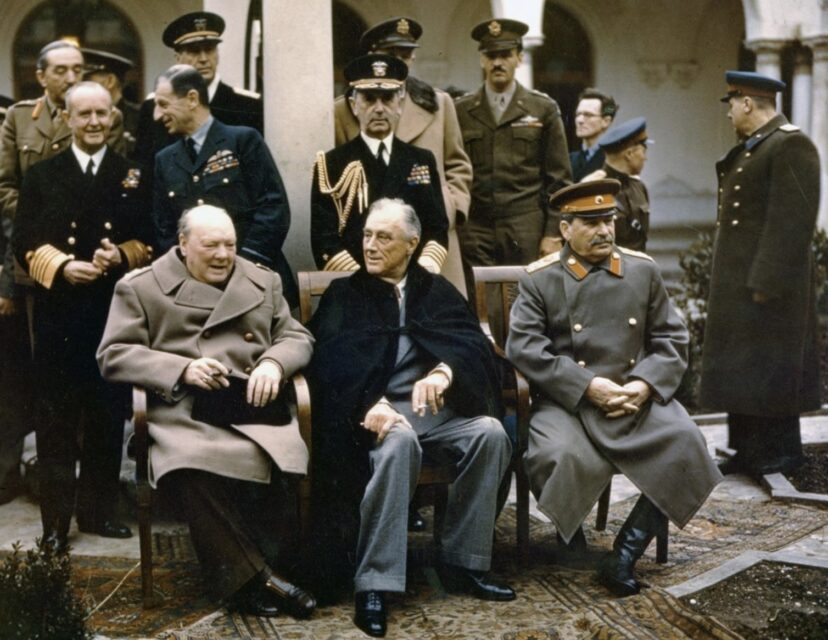If you’d told somebody in the mid 2000s that David Cameron would become Prime Minister, they would have laughed in your face. If you then told them that a few years later Boris Johnson would be one of his successors, they’d consider you bonkers. This was Blairite Britain – gone were the days of Macmillan, Douglas-Home, and the coterie of other prime ministers educated at that same dusty institution – the hegemony of the Old Etonian was firmly over. Yet Cameron became the 19th Prime Minister educated there, and Boris the 20th, making five out of the fourteen prime ministers elected during Queen Elizabeth II’s reign Old Etonians.
When I first started there, the traditions seemed daunting, and while you had a week of grace period to find your feet, it took a lot longer for the novelty truly to wear off. Dressed in a tailsuit that makes you look like a penguin, and that even the production team of Downton Abbey would question, it’s a complete culture shock. Teachers become “beaks”; homework becomes “EW (short for Extra Work)”, and the threat of “tardy book” (a punishment where you have to get up early to report to the School Office) is ever present. Your life is governed by a tutor, housemaster, and dame (a surrogate mother for your time there, and the most influential person in your day-to-day life), and outside of lessons (known as “schools”) you’re left to your own devices. It’s a sink or swim situation, and some can’t hack the overload of independence.
You’re constantly surrounded by things named after great men who have come before you – whether that be John Maynard Keynes (an economics society) or William Gladstone (a library) – and you can’t help but see yourself as heir to some great dynasty. Sitting in Upper School – a large schoolroom now mainly used for talks by visiting speakers – the walls are lined with marble busts of illustrious Old Etonians past, and it’s not hard to daydream about joining them. In our first ever assembly the head master put it best: “If you know that some interesting people have gone on to do some interesting things, whether it’s George Orwell or the Duke of Wellington, that does implicitly ask the question, why not you?” Success never seems far away, and often you’re regaled with tales about the time your beak caught a famous actor smoking, or how awful a pupil a noted academic once was. Neither does service, particularly when you pass the memorial boards for the First World War (as you do daily on the way to chapel): 1157 Old Etonians died, and 37 Old Etonians have won the Victoria Cross – 17 more than any other school.
In your final years, it’s fun to try and work out who’s going to be most successful after leaving, and – it never seems too outlandish – who among you could be a future prime minister. The people you consider are never confined to a particular group – it’s not “one of the debaters” or “one of the Rugby XV” – in fact, it’s often those who you can’t seem to categorize, or transverse the groups that are most magnetic. To get into Eton, you have to do well in the infamous “List Test”, composed of a computerized assessment and an interview with one of the beaks. For an eleven year old, it can be brutal (one boy left crying midway through our test), particularly as you don’t know what they want: they’re not looking for candidates that fit a particular box. Potential is valued more than current ability, and the greatest asset is that of being interesting. With only one in five getting an offer (odds stiffer than Oxbridge), and after five years of being expected to perform at the highest level, it’s unsurprising that students end up so successful.
Ivo Delingpole, “Boris and the Spirit of Eton”, Die Weltwoche, 2020-01-29.
March 6, 2025
QotD: Old Etonians
March 5, 2025
The Korean War 037 – Matt the Ripper! – March 4, 1951
The Korean War by Indy Neidell
Published 4 Mar 2025This week is really a week of planning, as Matt Ridgway unveils the plans for Operation Ripper — to follow the somewhat disappointing Operation Killer, but there are South Korean spies involved, the blockade of Wonsan, and the continuing escalation of tensions between Douglas MacArthur and Harry Truman, with people in American High Command concerned that MacArthur is bent on starting World War 3.
Chapters
00:00 Intro
00:25 Recap
00:44 Killer and Ripper
04:14 Intel and Distractions
06:57 South Korean Spies
08:06 Truman and MacArthur (Again)
(more…)
Colt Boa: Rarest of the Snake Revolvers
Forgotten Weapons
Published 13 Nov 2024Of the seven revolvers Colt named after snakes, the rarest is the Colt Boa. Only a single production run of these were made totaling just 1,200 guns. They were made in 1985 as a custom order for the Lew Horton distribution company, which wanted something unique to offer its buyers. The Boa was an intermediary between the standard Colt MkV and the high-end Python. It was a 6-shot .357 Magnum with a full underlay and ventilated shroud. The only variation was in barrel length, as half were made with 4” barrels and half with 6” barrels. The serial numbers were “BOAxxxx”, with the 4” guns having odd numbers and the 6” ones getting even numbers. Five hundred of each were sold individually, but the first 100 of each length were packaged together into sequentially-numbered pairs in fancy cases.
The Boas all sold in 1985, and they are now the hardest to find for the Colt Snake collector. This particular pair is a gorgeous example of an original cased set, numbers 43 and 44.
(more…)
QotD: British and French Enlightenments
In 2005, [Gertrude Himmelfarb] published The Roads to Modernity: The British, French, and American Enlightenments. It is a provocative revision of the typical story of the intellectual era of the late eighteenth century that made the modern world. In particular, it explains the source of the fundamental division that still doggedly grips Western political life: that between Left and Right, or progressives and conservatives. From the outset, each side had its own philosophical assumptions and its own view of the human condition. Roads to Modernity shows why one of these sides has generated a steady progeny of historical successes while its rival has consistently lurched from one disaster to the next.
By the time she wrote, a number of historians had accepted that the Enlightenment, once characterized as the “Age of Reason”, came in two versions, the radical and the skeptical. The former was identified with France, the latter with Scotland. Historians of the period also acknowledged that the anti-clericalism that obsessed the French philosophes was not reciprocated in Britain or America. Indeed, in both the latter countries many Enlightenment concepts — human rights, liberty, equality, tolerance, science, progress — complemented rather than opposed church thinking.
Himmelfarb joined this revisionist process and accelerated its pace dramatically. She argued that, central though many Scots were to the movement, there were also so many original English contributors that a more accurate name than the “Scottish Enlightenment” would be the “British Enlightenment”.
Moreover, unlike the French who elevated reason to a primary role in human affairs, British thinkers gave reason a secondary, instrumental role. In Britain it was virtue that trumped all other qualities. This was not personal virtue but the “social virtues” — compassion, benevolence, sympathy — which British philosophers believed naturally, instinctively, and habitually bound people to one another. This amounted to a moral reformation.
In making her case, Himmelfarb included people in the British Enlightenment who until then had been assumed to be part of the Counter-Enlightenment, especially John Wesley and Edmund Burke. She assigned prominent roles to the social movements of Methodism and Evangelical philanthropy. Despite the fact that the American colonists rebelled from Britain to found a republic, Himmelfarb demonstrated how very close they were to the British Enlightenment and how distant from French republicans.
In France, the ideology of reason challenged not only religion and the church, but also all the institutions dependent upon them. Reason was inherently subversive. But British moral philosophy was reformist rather than radical, respectful of both the past and present, even while looking forward to a more enlightened future. It was optimistic and had no quarrel with religion, which was why in both Britain and the United States, the church itself could become a principal source for the spread of enlightened ideas.
In Britain, the elevation of the social virtues derived from both academic philosophy and religious practice. In the eighteenth century, Adam Smith, the professor of moral philosophy at Glasgow University, was more celebrated for his Theory of Moral Sentiments (1759) than for his later thesis about the wealth of nations. He argued that sympathy and benevolence were moral virtues that sprang directly from the human condition. In being virtuous, especially towards those who could not help themselves, man rewarded himself by fulfilling his human nature.
Edmund Burke began public life as a disciple of Smith. He wrote an early pamphlet on scarcity which endorsed Smith’s laissez-faire approach as the best way to serve not only economic activity in general but the lower orders in particular. His Counter-Enlightenment status is usually assigned for his critique of the French Revolution, but Burke was at the same time a supporter of American independence. While his own government was pursuing its military campaign in America, Burke was urging it to respect the liberty of both Americans and Englishmen.
Some historians have been led by this apparent paradox to claim that at different stages of his life there were two different Edmund Burkes, one liberal and the other conservative. Himmelfarb disagreed. She argued that his views were always consistent with the ideas about moral virtue that permeated the whole of the British Enlightenment. Indeed, Burke took this philosophy a step further by making the “sentiments, manners, and moral opinion” of the people the basis not only of social relations but also of politics.
Keith Windschuttle, “Gertrude Himmelfarb and the Enlightenment”, New Criterion, 2020-02.
March 4, 2025
FDR – behind closed doors – was as bad as Trump while the Dunkirk evacuation was going on
Winston Churchill became prime minister of Britain the same day the Germans launched their attack against France and the Low Countries in May, 1940. The situation went from bad to appalling in very short order as the vaunted French army’s high command crumbled under the stress (even if the soldiers fought bravely in most cases). The British Expeditionary Force retreated with the French mobile forces toward the English Channel, eventually evacuating as many troops as they could from the port of Dunkirk. During this time, Churchill was appealing to the American President Franklin D. Roosevelt for whatever aid he could send.
Postwar histories tended to portray FDR as both benevolent and helpful toward Churchill in this stressful period, but behind closed doors FDR was far less a future ally, as Andreas Koureas explained on Twitter:
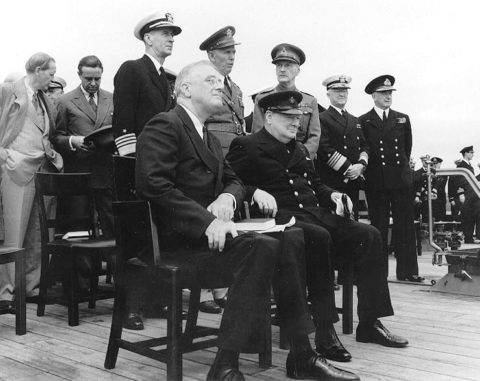
More than a year after FDR’s attempt to pry Canada and the Royal Navy away from a “dying” Britain, he and Churchill met onboard HMS Prince of Wales, in Placentia Bay, Newfoundland, during the Atlantic Charter Conference. President Franklin D. Roosevelt (left) and Prime Minister Winston Churchill are seated in the foreground. Standing directly behind them are Admiral Ernest J. King, USN; General George C. Marshall, U.S. Army; General Sir John Dill, British Army; Admiral Harold R. Stark, USN; and Admiral Sir Dudley Pound, RN. At far left is Harry Hopkins, talking with W. Averell Harriman.
US Naval Historical Center Photograph #: NH 67209 via Wikimedia Commons.
Ironically, the truth is that in 1940, Roosevelt — behind closed doors — behaved worse than Trump.
On the 20th May 1940, after multiple failed pleas for aid, Churchill wrote to Roosevelt that:
“If members of the present administration were finished and others came in to parley amid the ruins, you must not be blind to the fact that the sole remaining bargaining counter with Germany would be the fleet, and if this country was left by the United States to its fate no one would have the right to blame those then responsible if they made the best terms they could for the surviving inhabitants. Excuse me, Mr. President, putting this nightmare bluntly.”
Roosevelt’s refusal for aid was understandable given the political situation in America. As he told Churchill earlier that month, it wasn’t “wise for that suggestion to be made to the Congress at this moment”.
However, what he did after the 20th May telegram wasn’t.
Not bothering to even reply to Churchill’s warnings, Roosevelt instead sought to get Canada to give up on Britain.
As Roosevelt thought that Britain would likely collapse, and Churchill could not be trusted to maintain the struggle, he summoned a delegation for Canada.
The aim was to get Canada to pester Britain to have the Royal Navy sent across the Atlantic, before Britain’s seemingly-inevitable collapse.
Furthermore, to ensure this, the Americans wanted Canada to encourage the other British Dominions to get on board such a plan, and likewise gang up against Britain.
You can see Mackenzie King’s (PM of Canada) disbelief and horror in his diary,
“The United States was seeking to save itself at the expense of Britain. That it was an appeal to the selfishness of the Dominions at the expense of the British Isles. […] I instinctively revolted against such a thought. My reaction was that I would rather die than do aught to save ourselves or any part of this continent at the expense of Britain.”
King telegrammed Churchill on the 30th May that this was the closed-door political situation across the Atlantic.
Bear in mind, Roosevelt was trying to instigate this during the Dunkirk evacuations.
How Churchill didn’t break knowing the one ally he needed in his darkest hour thought he’d fail, I have no idea.
On the 5th June 1940, Churchill wrote back to Mackenzie King,
“We must be careful not to let the Americans view too complacently prospect of a British collapse, out of which they would get the British Fleet and the guardianship of the British Empire, minus Great Britain. […] Although President [Roosevelt] is our best friend, no practical help has been forthcoming from the United States as yet.”
(The first key mover that swung Roosevelt into entrusting Churchill to continue the struggle — and as such aid would not be wasted on Britain — was when Churchill ordered the Royal Navy’s Force H to open fire and destroy the French Fleet at Mers-el-Kébir — after Admiral Gensoul had refused the very reasonable offers from Britain, despite Germany and Italy demanding the transference of the French Fleet as part of the armistices.)
“Rare metals” are not really rare at all
On the social media platform formerly known as Twitter, John Ringo explains why the US doesn’t exploit its own vast reserves of “rare metals”:
I love every single time someone goes ‘CHINA HAS A LOCK ON RARE METALS! WE NEED TO ALLY WITH COUNTRY X TO GET RARE METALS! WE NEED RARE METALS!’
The US has huge deposits of pretty much everything we need. Lithium? Got it. Neodymium? Got it. Silver? Spades. Montana’s practically made of it.
The reason we don’t mine it here is the stupid ways our laws are written and allowing the Chinese to play us.
There’s an area in TX that has as much neodymium as the Chinese deposits that supply 98% of the world’s neodymium. (Critical material in rare earth magnets which are in turn critical in … so many things. Drones. Electric cars. Etc.)
There’s even a registered mine. Which was open.
Why is it closed?
The Chinese drop the prices below production cost (dumping) every time they open. Then jack the price and play political games with it when it closes.
There’s a silver mine in Montana (critical in modern solar) which has been trying to open for FIFTEEN YEARS.
Why can’t it open?
Tied up in environmental lawsuits because Congress won’t amend the EPA act that allows anyone to sue for any reason whatsoever and damn having mining or manufacturing WE DON’T NEED THAT WE NEED TO SAVE THE WORLD!
AND SLAVA UKRAINE YOU MAGA BASTARDS! TRUMP IS PUTIN’S COCK HOLSTER! WE NEED TO MANUFACTURE MORE WEAPONS TO SEND TO UKRAINE BUT ONLY IN A PERFECTLY ENVIRONMENTAL FASHION!
‘Environmental’ emphasis on the ‘mental’.
Autarchy is the idea of a country neither importing nor exporting. Just keep everything in the country. Ourselves alone.
A few have tried it from time to time. India did at one point.
Nobody can do it. There’s ‘something’ that you need from outside.
Except the US. We more or less need some tropical stuff. Like coffee, tea, sugar. Palm oil. (Super important in soap.)
But we can, in reality, even dispense with tree rubber. We can make it all from artificial.
Which comes from oil.
And we have enough oil. Thank a fracker. We’ve got enough oil in Southwest Texas to supply the WORLD for a thousand years.
(Touch expensive compared to Persian Gulf. But the price is constantly coming down.)
All we need to do is change laws, and we can almost go it without any other country. Without import or export.
I’m not suggesting we do.
But I am suggesting we dedicate some serious attention to things like China manipulating trade to ensure they have a lock on rare metals.
That we prioritize internal production.
That we decouple critical issues from other countries.
Cause the way the world is going, we’re reaching a point we’re gonna have to go it alone and if we have allies and trade partners, I’d suggest they be in the Western Hemisphere.
Cause those fuckers cross the pond be crazy.
Fifteen years ago, Tim Worstall explained why China’s rare earth monopoly won’t stand up in the long run.
The Titanic Survivors Arrive in New York – Hamilton Pudding
Tasting History with Max Miller
Published 18 Oct 2024A tart with apricot jam topped with a vanilla cookie-like filling, and toasted meringue
City/Region: Carpathia | United Kingdom | United States of America
Time Period: 1903 | 1912The menu from the last meal aboard RMS Carpathia before it docked in New York, carrying the survivors of the Titanic, lists Pouding Hamilton as one of the dessert options. After a fruitless search of my late 19th- and early 20th-century cookbooks, I finally found one recipe for it in a newspaper from 1903.
Honestly, I don’t know why there isn’t more mention of this tart. It’s delicious. The texture has kind of a wonderful crumbly shortcrust quality to it, and it’s not too sweet. It’s reminiscent of a vanilla cookie with jam, and you could really swap out the apricot jam for any flavor you like. I could see this being a great dessert for the holidays.
Hamilton Pudding –
Line a pie dish with a good short crust and cover the bottom with a layer of apricot jam; then fill up with the following mixture: Cream three ounces of butter with the same quantity of caster sugar, then add the yolks of two well beaten eggs and the white of one. Sift in by degrees three ounces of flour and flavor with a few drops of vanilla essence. Bake in a moderate oven and when nearly cooked beat the remaining white of egg to a stiff froth and lay it on top in tough lumps. Return the pudding to the oven till it is slightly browned.
— The Gazette, York, Pennsylvania, Sunday, August 9, 1903.
March 3, 2025
Is DOGE merely uncovering what used to be called “honest” graft?
Jon Miltimore explains where the expression “honest graft” came from and gives examples of what the DOGE investigations have turned up so far:
In 1905, George Washington Plunkitt made arguably the most famous defense of political graft in American history.
“Everybody is talkin’ these days about Tammany men growin’ rich on graft,” the New York state senator and Tammany Hall member wrote, “but nobody thinks of drawin’ the distinction between honest graft and dishonest graft”.
Plunkitt was responding to The Shame of the Cities, a book by journalist Lincoln Steffens that exposed sweeping political corruption in U.S. cities.
The ward boss’s shameless defense of “honest graft”, which is still assigned to undergraduates a century after Plunkitt’s death, comes to mind when looking at the fraud, waste, and abuse Elon Musk’s Department of Government Efficiency and others are uncovering.
To take but one example, consider the billions of dollars in taxpayer funds the Environmental Protection Agency awarded last year to Power Forward Communities. If you’ve never heard of the nonprofit group, you’re forgiven. Almost nobody has — because it didn’t exist until late 2023.
Power Forward Communities had no footprint, online or otherwise, until October 2023, when it was announced as part of the Rewiring America program, an organization linked to former Georgia Democratic gubernatorial candidate Stacey Abrams, which says its mission is “all about Rewiring America’s values, people, and culture.”
Less than a year after its creation, Power Forward Communities was awarded $2 billion via the EPA’s National Clean Investment Fund — even though it reported just $100 in revenue during its first three months of operation.
The payment, which is slated to continue through June 2031, caught the attention of Lee Zeldin, the new EPA administrator.
“It’s extremely concerning that an organization that reported just $100 in revenue in 2023 was chosen to receive $2 billion,” Zeldin said.
Indeed. It’s graft on a scale the Tammany Hall charlatans couldn’t have imagined.
Historical sources say 19th-century politician Boss Tweed and his ring of cronies took in at least $50 million in corrupt money in backroom deals, kickbacks, and skimming before Tweed was convicted of larceny and forgery in 1873 and fled to Cuba, and later Spain. In 2025 dollars, that’s about $1.3 billion — considerably less than the single payoff former President Joe Biden’s EPA awarded Power Forward Communities.
Europe’s Imperial Giants: On the Brink of Collapse? – W2W 09 Q4 1946
TimeGhost History
Published 2 Mar 2025In 1946, Britain, France, and the Netherlands fight to regain control over shattered colonies — from Indonesia’s revolt to Vietnam’s war with France. Meanwhile, the U.S. and USSR maneuver to shape these emerging nations for their own global interests. Will independence spark true liberation, or will it simply swap one master for another?
(more…)
Trump and Zelensky in “the most amazing bilateral meeting and press conference of all time”
In the free-to-cheapskates portion of his latest post, eugyppius considers the most newsworthy press conference in living memory between US President Donald Trump and Ukrainian President Vladimir Zelensky that went theatrically wrong:
Since 2022, the Ukrainian President Vladimir Zelensky has been running about the globe in his weird focus-grouped jumpers and combat boots, lecturing all of our parliaments on the unity and mutual interests of Europe, the goodness of democracy, the genocidal evils of Vladimir Putin and the importance of ever more weapons deliveries to his country’s armed forces. In the process, he has become one of the more obnoxious political phenomena in recent memory, and I hope I would be able to see this even if I were firmly convinced that German interests aligned perfectly with Ukrainian interests and that we should do nothing but give the AFU all of our tanks and all of our Taurus missiles and possibly even all of our soldiers to defend our shiny wonderful and deeply liberal European democracy, where we are so free that riot police will bash your head in for protesting Covid restrictions and if you call the wrong cabinet minister a moron the speech crimes battalion will raid your house.
Here in Europe, our political leaders have treated the shouting, remonstrating Zelensky with nothing but egregious reverence, and the man has grown accustomed to his noxious political celebrity. Nothing else can explain the amazing press conference Zelensky and Trump held yesterday, ahead of afternoon plans to sign an agreement concerning Ukraine’s rare-earth minerals. We got to witness nothing less than the near-total meltdown of American and Ukrainian relations, live and in colour. Historians of the Ukraine war will be writing about this press conference for years and decades to come.
The meeting almost didn’t happen at all. Zelensky has been publicly irritated that Trump reversed the American policy of isolating Russia, after the American president opened talks with Vladimir Putin to end the war. Two weeks ago, Trump suggested that Ukraine was at fault for the hostilities, Zelensky said Trump was “living in a [Russian] disinformation space“, and Trump said Zelensky was “a dictator without elections“. Trump’s administration initially planned to cancel Zelensky’s visit to Washington this week, but French President Emmanuel Macron persuaded the Americans to go ahead with it. Imagine how much the man regrets that now. After receiving his verbal beat-down in the Oval Office, Zelensky and the rest of the Ukrainian delegation decamped to the Roosevelt Room, while Trump and his advisers decided that the President of Ukraine “was in no position to negotiate“. White House officials told them to leave before they could even eat lunch.
Foreign relations are typically pounded out in back rooms, out of sight, and that was also the intent here. Somewhere in the midst of the journalists’ questions and Trump’s banter, however, yesterday’s event ceased being a press conference and became at first a subtle unacknowledged negotiation and then a hostile disagreement – one which Zelensky got the worst of.
Mark Steyn examines what was said both before and during the Zelensky-Trump slap fight:
The Beltway rumour is that, on his flight to DC, Zelenskyyyy was telephoned by Victoria Nuland, She-Wolf of the Donbass, plus Susan Rice and Anthony Blinken and advised to get tough with Trump. If true, that’s gotta be the worst episode of “Phone-a-Friend” since the plucky little Ukrainian started playing Who Wants to Be a Billionaire (in Euros)? For all you nuanced diplomatists out there, there is now a rather arcane dispute as to whether Z called the Vice President of the United States a “bitch” or merely interjected “f**king hell”:
He literally didn’t. He said “suka blyat“, which, like “kurwa mać” in Polish, is an expression of annoyance equivalent to “fucking hell”. Not ideal politics, granted, but not the same.https://t.co/mOgGZN9iwh
— Ben Sixsmith (@BDSixsmith) March 1, 2025
UPDATE! From Leonid in our comments section:
If the audio is not altered, it does sound like ‘suka, blyad‘ which is akin to ‘f**king piece of sh*t’. It is not necessarily directed at Vance personally, but I specifically translated this as ‘f**king piece of sh*t’, not ‘f**king hell’ because it can indeed be taken as directed at Vance, too. Obviously, even the milder reading doesn’t absolve Z of being an a**hole.
The Ukrainian ambassador seemed to be the only member of Z’s delegation who grasped how badly things were degenerating: the cameras captured her at one point with her head in her hands. The President booted the guy from the White House and gave the Ukrainian’s lunch to the Oval Office interns. I have always found the American vernacular “oh, the guy totally ate my lunch” incredibly lame, but, if Trump is now proposing to make it literal, I wish he’d started with Keir Starmer. Fortunately, America’s wanker media could be relied upon to agree that, when it comes to Z vs T, “the world” sides with Ukraine.
World opinion has been swift, loud and mostly unanimous against the childish behavior today of Trump and Vance. The only question now is if other countries realize that the USA they’ve long known, loved and respected is no longer a reliable ally.
— Aaron Astor (@AstorAaron) February 28, 2025
By “world opinion”, Mr Astor means not China, India, South Africa, Brazil or Saudi Arabia, but the Prime Minister of Luxembourg:
Luxembourg stands with Ukraine. You are fighting for your freedom and a rules based international order.
— Luc Frieden (@LucFrieden) February 28, 2025
From the blissful ignorance of a California congressman:
My grandfather and the Greatest Generation didn’t fight in World War II to see our country side with murderous thugs like Putin. This is a disgrace. https://t.co/3ZrB8ur2Au
— Mike Levin (@MikeLevin) February 28, 2025
Er, in your extensive researches into World War Two, did you ever happen to come across a photograph of, say, the Yalta summit?
Still, if Luxembourgish prime ministers are going through one of their periodic butch phases, I prefer the words of Mr Frieden’s predecessor, Jacques Poos, who a third-of-a-century back, as Yugoslavia was disintegrating, told the Yanks to butt out and declared “The hour of Europe has come!” He was right, kind of: shortly thereafter, Bosnian Serbs began tying Continental peacekeepers to trees.
Mr Frieden, like many other politicians and geopolitical experts, has failed to grasp the essential dynamic of yesterday’s meeting – which is very simple:
Zelenskyyyy needs Trump far more than Trump needs Zelenskyyyy.
All The Basics About XENOPHON
MoAn Inc.
Published 7 Nov 2024I actually found this video really tricky considering I want to go into the texts of Xenophon and if I told you everything about the march of the ten thousand then I would have just told you the whole Anabasis?? Which defeats the whole purpose of an introductory video?? So I PROMISE more clarity will come in future videos as Xenophon himself breaks down his journey home from Persia and why they were there in the first place. Therefore, you have ALL OF THAT to look forward to — coming soon!!!
(more…)
QotD: Arguments around “spontaneous order” and “divine intervention”
A libertarian economist I read fairly often once noted that he found it interesting that many people on the political left who believe in natural selection without any kind of guidance cannot accept the idea that economical order can arise without their guidance. And, likewise, many on the right are completely comfortable with spontaneous order in free markets but can’t conceive of it in the natural world.
It seems to me that this is a bit like the old “irresistible force versus immovable object” paradox. On the one hand, the universe, life, human life, seem impossibly complex to have happened randomly. On the other hand, the universe is actually very large. Perhaps there are enough monkeys banging away at typewriters to produce not just Shakespeare, but the script of every Seinfeld episode.
Esteban, “Evolution, Economies And Spontaneous Order”, Continental Telegraph, 2020-01-22.

